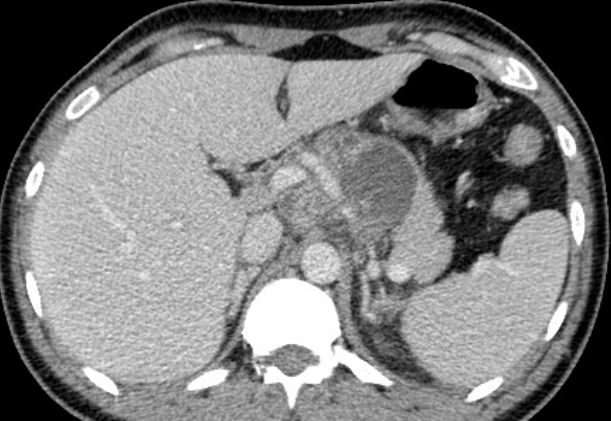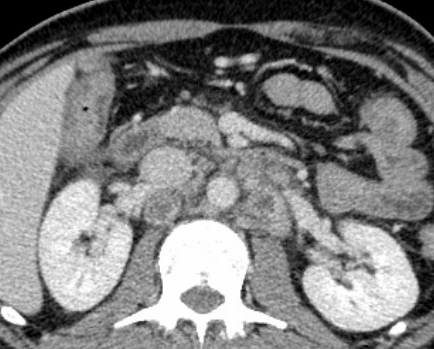Tuesday Poster Session
Category: Biliary/Pancreas
P4433 - Tuberculosis Masquerading as a Pancreatic Abscess
Tuesday, October 28, 2025
10:30 AM - 4:00 PM PDT
Location: Exhibit Hall
.jpg)
Muaaz Masood, MD
Division of Gastroenterology and Hepatology, Center for Digestive Health, Virginia Mason Franciscan Health
Seattle, WA
Presenting Author(s)
Award: ACG Presidential Poster Award
Muaaz Masood, MD1, Molly Anderson, DO2, Amita Kasar, MD3, Wendy Hsu, MD2, Nihaal Karnik, MD4, Shayan Irani, MD2
1Division of Gastroenterology and Hepatology, Center for Digestive Health, Virginia Mason Franciscan Health, Seattle, WA; 2Virginia Mason Franciscan Health, Seattle, WA; 3Poplar Bluff Regional Medical center, Poplar Bluff, MO; 4Geisinger Community Medical Center, Scranton, PA
Introduction: Tuberculosis (TB) is caused by airborne droplet transmission of Mycobacterium tuberculosis. While it primarily affects the lungs, TB can involve the ileocecal region, liver, spleen and kidneys. Pancreatic TB is an extremely rare form of abdominal TB that has been reported in 2-4.7% of patients and often mimics pancreatic malignancy which can make the diagnosis challenging.
Case Description/
Methods: A 32-year-old male presented to an outside hospital with intermittent fevers, epigastric abdominal pain radiating to the left side of the abdomen and back, nausea, and an unintentional 12-pound weight loss. He emigrated from India 1 year ago and denied known exposure to TB or pulmonary symptoms. CT abdomen and pelvis with contrast revealed a 4.3 cm cystic mass of the pancreatic body and necrotic lymphadenopathy of the porta hepatis, peripancreatic region, and adjacent retroperitoneum. The patient was transferred to our facility for advanced endoscopy. CEA, AFP and CA 19-9 were normal. EUS-guided transgastric drainage of the peripancreatic abscess using a lumen-apposing metal stent, ERCP with pancreatic sphincterotomy and pancreatic duct stent placement were performed. Abscess cultures were positive for acid fast bacilli. Rifampin, isoniazid, pyrazinamide, and ethambutol (RIPE) therapy with Vitamin B6 was initiated. HIV testing was positive with a CD4 count of 10 cells/mcL and a high viral load of 653,342 copies, for which he was started on ART. The patient was discharged home in a stable condition.
Discussion: Pancreatic TB is extremely rare given the anti-mycobacterial effects of pancreatic enzymes. Our patient had several risk factors including undiagnosed HIV and emigration from an endemic area. Pancreatic TB can occur from hematogenous, lymphatic or direct spread from adjacent organs. Clinical presentation is often similar to pancreatic malignancy with abdominal pain, although constitutional symptoms are often present, with a pancreatic mass and peripancreatic necrotic lymphadenopathy on imaging. Historically, pancreatic TB was diagnosed during a laparotomy. More recently, EUS with fine needle aspiration cytology, microbiology and PCR assay have been the preferred method for diagnosis. Treatment involves 6-12 months of RIPE with resolution of infection in most cases. Clinicians should include pancreatic TB in the differential for a pancreatic mass with necrotic peripancreatic lymphadenopathy in a patient from an endemic area to avoid surgery and associated morbidity and mortality.

Figure: Figure 1. An axial view of a computed tomography scan of the abdomen and pelvis with intravenous contrast revealed a 4.3 centimeter predominantly cystic mass of the superior aspect of the pancreatic body.

Figure: Figure 2. An axial view of a computed tomography scan of the abdomen and pelvis with intravenous contrast revealed a conglomerate central necrotic lymphadenopathy of the porta hepatis, peripancreatic region, and adjacent retroperitoneum.
Disclosures:
Muaaz Masood indicated no relevant financial relationships.
Molly Anderson indicated no relevant financial relationships.
Amita Kasar indicated no relevant financial relationships.
Wendy Hsu indicated no relevant financial relationships.
Nihaal Karnik indicated no relevant financial relationships.
Shayan Irani: Boston Scientific – Consultant. Conmed – Consultant. Gore – Consultant.
Muaaz Masood, MD1, Molly Anderson, DO2, Amita Kasar, MD3, Wendy Hsu, MD2, Nihaal Karnik, MD4, Shayan Irani, MD2. P4433 - Tuberculosis Masquerading as a Pancreatic Abscess, ACG 2025 Annual Scientific Meeting Abstracts. Phoenix, AZ: American College of Gastroenterology.
Muaaz Masood, MD1, Molly Anderson, DO2, Amita Kasar, MD3, Wendy Hsu, MD2, Nihaal Karnik, MD4, Shayan Irani, MD2
1Division of Gastroenterology and Hepatology, Center for Digestive Health, Virginia Mason Franciscan Health, Seattle, WA; 2Virginia Mason Franciscan Health, Seattle, WA; 3Poplar Bluff Regional Medical center, Poplar Bluff, MO; 4Geisinger Community Medical Center, Scranton, PA
Introduction: Tuberculosis (TB) is caused by airborne droplet transmission of Mycobacterium tuberculosis. While it primarily affects the lungs, TB can involve the ileocecal region, liver, spleen and kidneys. Pancreatic TB is an extremely rare form of abdominal TB that has been reported in 2-4.7% of patients and often mimics pancreatic malignancy which can make the diagnosis challenging.
Case Description/
Methods: A 32-year-old male presented to an outside hospital with intermittent fevers, epigastric abdominal pain radiating to the left side of the abdomen and back, nausea, and an unintentional 12-pound weight loss. He emigrated from India 1 year ago and denied known exposure to TB or pulmonary symptoms. CT abdomen and pelvis with contrast revealed a 4.3 cm cystic mass of the pancreatic body and necrotic lymphadenopathy of the porta hepatis, peripancreatic region, and adjacent retroperitoneum. The patient was transferred to our facility for advanced endoscopy. CEA, AFP and CA 19-9 were normal. EUS-guided transgastric drainage of the peripancreatic abscess using a lumen-apposing metal stent, ERCP with pancreatic sphincterotomy and pancreatic duct stent placement were performed. Abscess cultures were positive for acid fast bacilli. Rifampin, isoniazid, pyrazinamide, and ethambutol (RIPE) therapy with Vitamin B6 was initiated. HIV testing was positive with a CD4 count of 10 cells/mcL and a high viral load of 653,342 copies, for which he was started on ART. The patient was discharged home in a stable condition.
Discussion: Pancreatic TB is extremely rare given the anti-mycobacterial effects of pancreatic enzymes. Our patient had several risk factors including undiagnosed HIV and emigration from an endemic area. Pancreatic TB can occur from hematogenous, lymphatic or direct spread from adjacent organs. Clinical presentation is often similar to pancreatic malignancy with abdominal pain, although constitutional symptoms are often present, with a pancreatic mass and peripancreatic necrotic lymphadenopathy on imaging. Historically, pancreatic TB was diagnosed during a laparotomy. More recently, EUS with fine needle aspiration cytology, microbiology and PCR assay have been the preferred method for diagnosis. Treatment involves 6-12 months of RIPE with resolution of infection in most cases. Clinicians should include pancreatic TB in the differential for a pancreatic mass with necrotic peripancreatic lymphadenopathy in a patient from an endemic area to avoid surgery and associated morbidity and mortality.

Figure: Figure 1. An axial view of a computed tomography scan of the abdomen and pelvis with intravenous contrast revealed a 4.3 centimeter predominantly cystic mass of the superior aspect of the pancreatic body.

Figure: Figure 2. An axial view of a computed tomography scan of the abdomen and pelvis with intravenous contrast revealed a conglomerate central necrotic lymphadenopathy of the porta hepatis, peripancreatic region, and adjacent retroperitoneum.
Disclosures:
Muaaz Masood indicated no relevant financial relationships.
Molly Anderson indicated no relevant financial relationships.
Amita Kasar indicated no relevant financial relationships.
Wendy Hsu indicated no relevant financial relationships.
Nihaal Karnik indicated no relevant financial relationships.
Shayan Irani: Boston Scientific – Consultant. Conmed – Consultant. Gore – Consultant.
Muaaz Masood, MD1, Molly Anderson, DO2, Amita Kasar, MD3, Wendy Hsu, MD2, Nihaal Karnik, MD4, Shayan Irani, MD2. P4433 - Tuberculosis Masquerading as a Pancreatic Abscess, ACG 2025 Annual Scientific Meeting Abstracts. Phoenix, AZ: American College of Gastroenterology.

